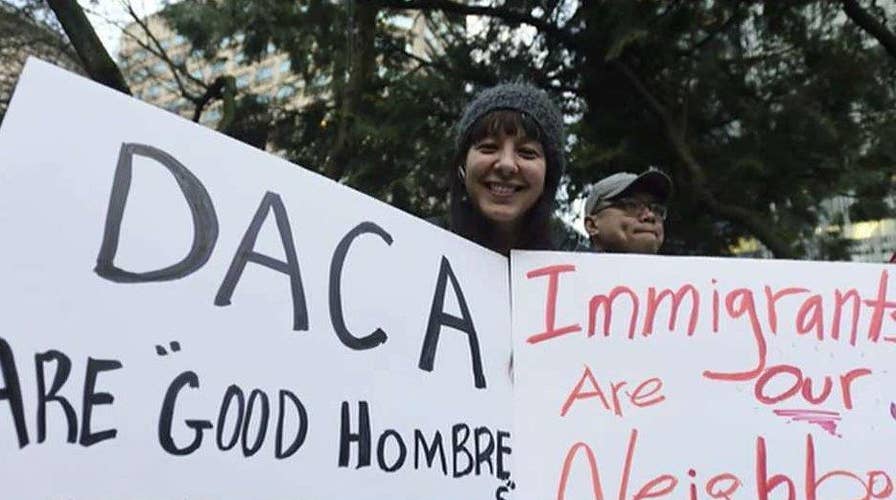DACA on the brink of elimination on 5th anniversary
Debate continues to rage over Obama's Deferred Action for Childhood Arrivals program as the nation wonders whether Trump will do away with it. Tucker takes on one advocate who wants to see DACA continue #Tucker
Ten states may soon sue President Trump -- for treating illegal immigrants too leniently.
Texas attorney general Ken Paxton and nine other state attorneys general plan to file suit against the Trump administration unless it ends the Deferred Action for Childhood Arrivals program by September 5.
DACA, a program established under President Obama, grants work permits and an official reprieve from deportation to over 750,000 illegal immigrants who came to the United States as minors.
President Trump lambasted DACA as unconstitutional on the campaign trail. He vowed to end it on Day One of his administration. But thus far, he has kept the program in place -- even though federal courts have found DACA to be an illegal overreach of executive authority, and the Trump Administration already ended a companion program that granted reprieves and work permits to parents of DACA recipients.
The Constitution gives Congress -- not the president -- the authority to determine who may legally enter and reside in the United States.
It's time for President Trump to fulfill his vow. DACA is flagrantly unconstitutional. And it hurts vulnerable American workers.
The Constitution gives Congress -- not the president -- the authority to determine who may legally enter and reside in the United States. One year before enacting DACA, President Obama himself explained "With respect to the notion that I can just suspend deportations through executive order, that's just not the case, because there are laws on the books that Congress has passed."
But President Obama and his lawyers found what they thought was a clever way around this constitutional barrier. DACA, they said, doesn't give permanent legal residency to illegal aliens. It merely makes them a very, very low priority for deportation. Such a low priority, in fact, that all 750,000 illegal aliens who signed up for the program would receive an official card instructing Immigration and Customs Enforcement not to deport them unless they committed multiple criminal offenses.
It's highly questionable whether the executive branch has this much leeway to selectively enforce Congress' immigration laws. Fifth Circuit Court of Appeals Judge Andrew Hanen, who issued an injunction freezing an expansion of the DACA program in 2015, explained that, "DHS cannot reasonably claim that, under a general delegation to establish enforcement policies, it can establish a blanket policy of non-enforcement that also awards legal presence and benefits to otherwise removable aliens."
Even supporters of amnesty for illegal aliens agree DACA is unconstitutional. In December, Senator Lindsay Graham tweeted, "In my view, the DACA Executive Order issued by President Obama was unconstitutional and President-elect Trump would be right to repeal it." For reference, Sen. Graham has sponsored the DREAM Act, a bill that would give U.S. citizenship to illegal aliens who came here as children.
Even if the executive branch did have authority to exempt an entire class of people from deportation, DACA would still be unconstitutional. That's because the president doesn't have the authority to hand out work permits to illegal aliens. As Judge Hanen noted, "Exercising prosecutorial discretion...does not also entail bestowing benefits."
Legal arguments aside, the DACA program hurts American workers.
An alarming number of American workers without college degrees are struggling to find work. In the first quarter of 2017, nearly four in ten native-born 18 to 29-year olds without college degrees were either unemployed or not in the labor force.
Illegal immigration exacerbates these young Americans' struggles by increasing the number of people competing for a limited supply of lower-skilled and entry-level jobs. Over the past 20 years, illegal aliens without high school degrees have inflated the low-skill U.S. workforce by approximately 22 percent.
The excess of low-skilled workers means companies don't need to raise wages to fill positions. Native-born workers without a high school degree would earn nearly $800 more annually if there were no illegal immigration.
The burdens of illegal immigration disproportionately fall on American minorities. Harvard Kennedy School economics professor George Borjas' explains that "Because a disproportionate percentage of immigrants have few skills, it is low-skilled American workers, including many blacks and Hispanics, who have suffered most from this wage dip."
Put simply, our most economically vulnerable citizens have the most to lose if President Trump preserves the DACA program.
President Trump repeatedly vowed to end DACA to protect American workers and the rule of law. It's time for him to follow through on this promise.





















